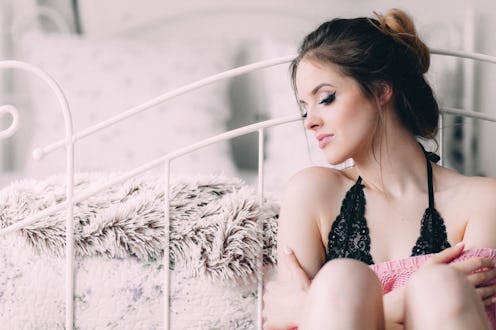Life
9 Super Subtle Signs A Person Might Have Anxiety

Some people are open about their anxiety and feel comfortable discussing it with others. But many people don't want to share the details of their mental health, and just because they don't talk about it doesn't mean you shouldn't be aware of it. There are a number of signs that indicate someone has hidden anxiety, and knowing that someone close to you is going through this can help you better understand how they function and may even inspire you to reach out in ways you normally wouldn't.
"People with anxiety often already worry about the judgement of others," says Kelsey Torgerson, a licensed clinical social worker and anxiety specialist, over email. "Although you may have an idea that someone you know is suffering from symptoms of anxiety, it can be very hard for them to open up about this. They may try and mask their anxiety."
It's important to note that each of these signs do not always mean it's anxiety or that something is wrong. "People can have off days or off weeks, but once these symptoms start to become more noticeable, say for weeks to months, that might be an indicator that anxiety is present," says psychotherapist Angela Ficken over email.
That being said, knowing the more subtle signs of anxiety can be useful and can help guide your interactions with people. Here are nine signs of a person with hidden anxiety.
1Failures Cause Big Reactions
Someone who seems overdramatic might just actually be suffering from anxiety. "People who have anxiety around performance or perception of others may have a really big reaction to a small failing, from a big outward meltdown to staying at home for the next few days," says Torgerson.
2They're Afraid To Take Risks
Because failures can be so debilitating, this might prevent someone with anxiety from taking risks. "This concern underneath has to do with not wanting to experience embarrassment, disappointment, anger, sadness or frustration," says psychologist Dr. Joan Rosenberg over email.
3They Seem Spaced Out Or Distracted
If you notice your friend, co-worker, or partner distracted or having difficulty remembering conversations or completing tasks, this can be a sign of anxiety. "When we get anxious, most of us get stuck in our head about some worry that is going to happen," says Ficken. "Someone is talking to us and we attempt to hold onto that conversation as we think about our worry. We are no longer fully present, which makes it that much more difficult to focus on friends, family, and tasks."
4They Are Often Sick
Constant stress has a huge effect on immune systems. "People with hidden anxiety can experience frequent illnesses because their immune system is compromised," say Torgerson. "On top of this, hiding their anxiety from others can cause even more stress on their system, due to keeping this information only to themselves and worrying about being open with others."
5They Are Critical Of Others
"Being critical of others often comes from people who are very critical of themselves, especially when there's underlying anxiety," says Torgerson. "When someone with hidden anxiety holds others to high standards, they probably have even higher standards for themselves."
6They Fidget Or Curl Up
Body language can signal a lot about what someone is feeling. "Anxiety has a physiological impact on our bodies," says Torgerson. "Its outward expression can include fidgeting with hands, wiggling or tapping feet, curling arms around one's body, or wrapping legs around one another multiple times."
7They're Always Late
You may notice someone who often comes in late to work. This can be a sign of depression, but it can also be anxiety. "If someone is feeling very anxious, the idea of getting up and facing the day can feel overwhelming," says Ficken. "It can feel easier to avoid friends, work, family, and be anxious, (although this never ends up making someone feel better)."
8They Always Need Order
Someone who insists on a sense of order and who feels unsettled when things are out of order might have anxiety, according to Rosenberg. "The external order helps provide a sense of calm," she says. This could manifest itself in the structure of their daily life or even just the way they organize their personal space.
9They Are Reluctant To Make New Friends
People with anxiety may find it difficult or may feel reluctant to make new friends. "The challenge here is often tied to not wanting to feel vulnerable, exposed, or embarrassed, or they have thought into the future and are already worrying about losing a friend they haven’t even yet developed," says Rosenberg.